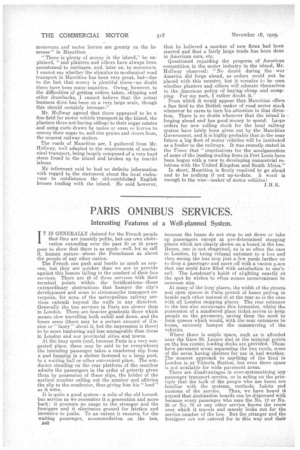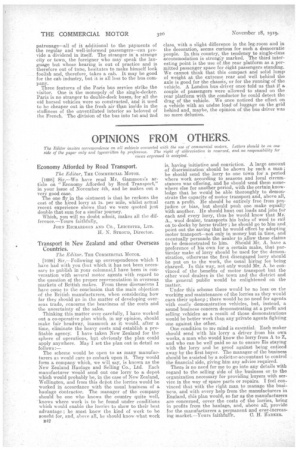PARIS OMNIBUS SERVICES.
Page 20

Page 22

If you've noticed an error in this article please click here to report it so we can fix it.
Interesting Features of a Well-planned System.
IT IS GENERALLY claimed for the French people that they are innately polite, but our own observation extending over the past 30 or 35 years goes to show that there is as much—well, let us call it, human nature—about the Frenchman as about the people of any other nation. The French can push and bustle as much as anyone, but they are qaicker than we are to provide against this human failing in the conduct of their bus services. There are 42 of these services with their terminal points . within the fortifications—those extraordinary obstructions that hamper the city's development and seem to circumscribe transport enterprise, for none of the metropolitan railway services extends beyond the walls in any direction. Generally the bus services in Paris are slower than in London. There are heavier gradients there which means slow travelling both uphill and down, and the buses seem (there may be a certain amount of illusion or " fancy " about it, but the impression is there) to he more lumbering and less manageable than those in Londonand oar provincial cities and towns. At. the busy spots (and, because Paris is a very congested place, these' may be said to be everywhere) the intending passenger takes a numbered slip from a pad hanging in a shelter fastened to a lamp post, to a waiting hall or other convenient place. The conductor standing on the rear platform of the omnibus admits the passengers in the order of priority given them by possession of these slips, the holder of the earliest number calling out the number and offering the slip to the conductor, thus giving him his " lead " as it were.
It is quite a good system—a relic.of the old horsedbus service as we remember it a generation and more back: it presents no snags to the stranger and the foreigner and it eliminates ground for friction and incentive to jostle. To an extent it ensures, for the waiting passenger, accommodation on the bus, BM because the buses do not stop to set down or take up passengers except at pre-determined stopping places which are clearly shown on a board in the bus. Hence, one is not chagrined, as is so often the ease in London, by being refused entrance to a bus and then seeing the bus stop just a few yards further on to drop a passenger and move off with a-vacant place that one could have filled with satisfaction to one'sself. The Londoner's habit of -alighting exactly at the spot he wishes to often means inconvenience to someone else. At many of the busy places, the width of the streets': and open spaces in Earls permit of buses pulling in beside each other instead of at the rear as is the ease with all London stopping places. The rear entrance to the bus also encourages this formation, whilst the possession of a nturobered place ticket serves to keep people on the pavement, saving them the need to form queues which would, with the rear entrances to buses, seriously hamper the manoeuvring of the vehicles. Where there is ample space, such as is afforded near the Gare St. Lazare and at the terminal paints on the bus routes', loading docks are provided. These have pavement areas separating the bus roads, Some of the areas having shelters for use in bad weather. The nearest approach to anything of the kind in London is at Victoria Station, but even there space is not available for wide pavement areas. There are disadvantages in over-systematizing any passenger transport service, or in acting on the principle that the bulk of the people who use buses are familiar with the systems, methods, habits and customs of the service. Thus, we have heard it argued that destination boards can he dispensed 'with, because every passenger who uses the No. 12 or No. 39 or No. 73 or any other service knows the route over which it travels and merely looks out for the service number of the bus. But the stranger and the foreigner are not catered -for in this way and their patronage—all of it additional to the payments of the regular and well-informed passengers--can provide a dividend in itself. The stranger in a strange city or town, the foreigner who may speak the language but whose hearing. is out of practice and is therefore out of tune, hesitates to make himself look foolish and, therefore, takes a cab. It may be good for the cab industry, but it is all loss to the bus company. Three features of the Paris bus service strike the visitor. One is the monopoly of the singledecker. Paris is no stranger to double-deck buses, for all the oid horsed vehic,es were so constructed, a-nd it used to be cheaper out in the fresh air than inside in the stuffiness of the unventilated interior so beloved of the French. The division of the bus into 1st and 2nd class with a slight difference in the leg-room and in the decoration, seems curious for such a democratic people. In, this country, the tendency to single-class accommodation is strongly marked. The third interesting point is the use of the rear platform as a permitted passenger space for eight passengers standing. We cannot think that this compact and solid lump of weight at the extreme rear and well behind the axle is good for the chassis, or for the running of the vehicle. A London bus driver once told us that if a couple of passengers were allowed to stand on the rear platform with the conductor he could detect the drag of the vehicle. We once noticed the effect on a vehicle with an undue load of luggage on the grid behind and maybe, the opinion of the bus driver was no mere delusion.




























